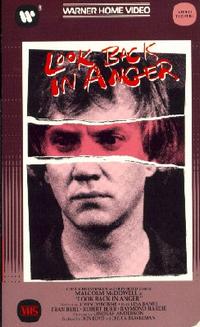| Look Back in Anger | |
|---|---|
 | |
| Directed by | Lindsay Anderson David Hugh Jones |
| Written by | John Osborne (play) |
| Based on | Look Back in Anger 1956 play by John Osborne |
| Produced by | Don Boyd Charles Braverman |
| Starring | Malcolm McDowell Lisa Banes Fran Brill Robert Burr Raymond Hardie |
| Distributed by | Showtime |
Release date |
|
Running time | 100 minutes |
| Country | United States |
| Language | English |
Look Back in Anger is a 1980 British film starring Malcolm McDowell, Lisa Banes and Fran Brill, and directed by Lindsay Anderson and David Hugh Jones. The film is based on John Osborne's play Look Back in Anger .